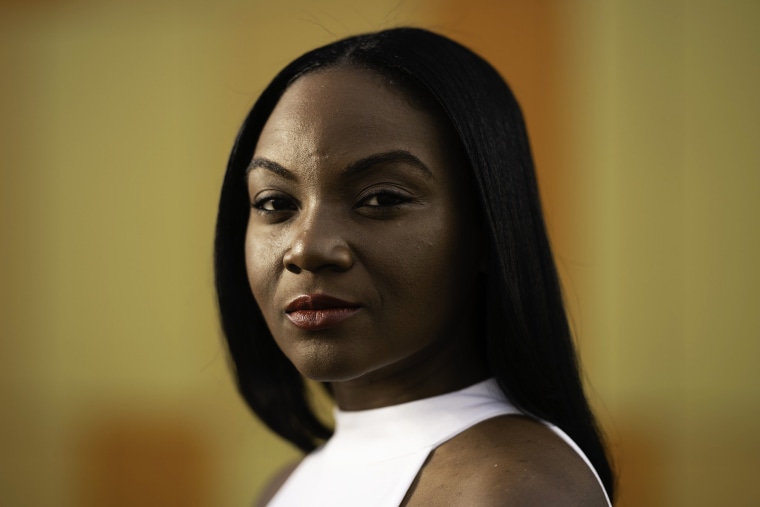She’s a globally renowned scientist and Covid-19 vaccine developer, yet Kizzmekia S. Corbett, Ph.D., modestly describes herself as a “little ole girl” from a small North Carolina town. Growing up, she saw firsthand the health challenges and disparities that proliferated in the Black community.
“I am from the rural South where ailments such as obesity, hypertension and diabetes plague communities like my own, and actually plague my family to some extent,” said Corbett, the keynote speaker at a Black History Month breakfast hosted by House Majority Leader Steny Hoyer (D-MD) and Rep. Anthony Brown (D-MD) over the weekend. The theme of the 41st annual event was “Black Health and Wellness.”
“I have grown to become invested in the health and wellness of all people,” she told the virtual audience of several hundred people. “But especially those who are oftentimes excluded from access and opportunities that afford them equal health and also at the end of the day, equal wealth.”
Amid the coronavirus pandemic that has left 900,000 dead in the U.S. alone, Corbett has emerged as a leading voice in vaccine development research and health equity.
She was instrumental in groundbreaking research that directly led to development of the Moderna Covid-19 vaccine, after spending more than six years as a research fellow at the National Institute of Allergy and Infectious Diseases’ (NIAID) Vaccine Research Center. It is part of the National Institutes of Health (NIH).
Last June, Corbett joined the Harvard T.H. Chan School of Public Health in Boston, as an assistant professor in the Department of Immunology and Infectious Diseases. She heads Harvard’s new Coronaviruses & Other Relevant Emerging Infectious Diseases (CoreID) Lab. Its scientists study and seek to understand the interface between hosts’ immune systems and viruses that cause respiratory disease, with the goal of informing development of novel and potentially universal vaccines.
“People always ask me: `Why vaccines? Why vaccines?,” she told the virtual audience. “They are oftentimes controversial, but at the end of the day taking all of the controversy aside, the one thing that remains is that vaccines happen to be the most life-saving way to prevent disease in this world.”
Still, she’s well aware that due to ideological differences, misinformation and partisan rancor there’s often been vocal disagreement with that assessment.
“I’ve been in a bubble since 16 years old, trying to become a vaccine developer. I had been at science labs, I had been at prestigious universities, I had been at the most prestigious vaccine research center in the world. So I hadn’t necessarily understood what it meant [for others] to mistrust medicine in the way I was faced with it, when it was my turn for my medicine to start to save lives.”
“Many of the people who were being disproportionately killed by this virus were unfortunately refusing to take the vaccine that I had made,” she added.
As a young, Black woman scientist, Corbett has used her platform to address vaccine hesitancy, or as she has termed it, “vaccine inquisitiveness,” especially in the Black community. She’s sought to reassure skeptics of its safety and efficacy by speaking virtually at churches and various community organizations.
“I expanded beyond being a Harvard professor to being the community vaccine teacher,” she told the audience. “I’ve become an expert in empathy as much as an expert in immunobiology. And in the same breath that I was a vaccine inventor, I oftentimes served as the vaccine’s cheerleader.”
Her efforts have earned praise from everyone from President Joe Biden to NIAID Director Dr. Anthony Fauci. In her introduction of Corbett at the event, Rep. Lauren Underwood (D-IL), a nurse who co-founded and co-chairs the Black Maternal Health Caucus also lauded her journey.
Corbett matriculated at the University of Maryland, Baltimore County, where as an undergraduate she was part of the prestigious Meyerhoff Scholars Program and a NIH scholar. After earning a BS in biological sciences, with a secondary major in sociology, she went on to obtain her Ph.D. in microbiology and immunology from The University of North Carolina at Chapel Hill.
“Dr. Corbett's research and contributions have undoubtedly saved countless lives thousands, perhaps millions, and alleviated untold suffering,” Rep. Hoyer said at the gathering, which in previous years has drawn such luminaries as Barack Obama, Vice President Kamala Harris and the late John Lewis, to name a few.
“Yet as we wade through a river, hope has stirred our hearts. Successful development and deployment of safe and effective Covid-19 vaccines last year breathed new life into our fight against this virus,” he continued. “The groundbreaking medical advances of mRNA vaccines expanded the boundaries of our scientific knowledge while helping to curb the spread and severity of the disease worldwide. Thank you, Dr. Corbett, and all those with whom you work.”
“I was very much mostly a Black woman with a mission and a duty,” said Corbett of her efforts, which are ongoing. “Because people are going to continue to have to hear about the science, about the new technology, and we’re going to have to continue to have the conversations. All the actions that we took in this moment, are going to have to continue to be tangible beyond this moment.”
